You can now add Healthify as a preferred source on Google. Click here to see us when you search Google.
Fever in children
Key points about fever in children
- A fever is a temperature over 38 degrees Celsius (38o C).
- A fever is usually caused by a virus, such as a cold. Fever is a normal way for a child to fight an infection.
- If your baby with a fever is under 3 months of age, always see a healthcare provider urgently.
- Fever by itself doesn't tell you whether your child is seriously sick.
- You know your child best. If you're worried at any stage, always seek help.
- The content on this page comes from KidsHealth.(external link)
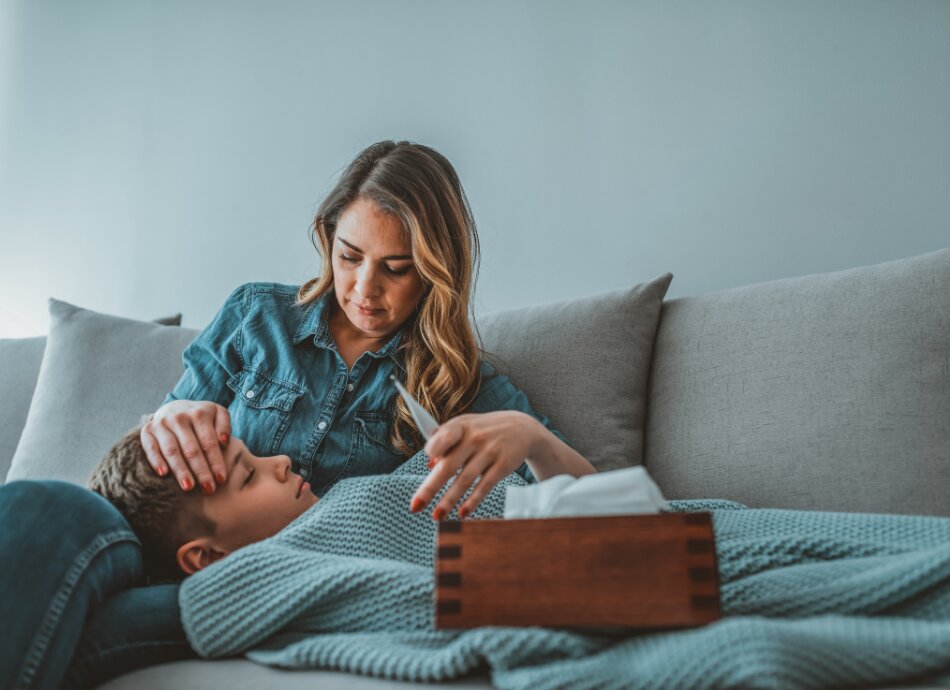
Fever is a normal way for a child to fight an infection.
- Normal temperature – your child's normal body temperature is about 37 degrees Celsius (37o C).
- A fever – your child has a fever if their temperature is 38 degrees Celsius (38o C) or higher.
- A high fever – this usually means a temperature of more than 38.5 degrees Celsius (38.5o C).
Being hot may make your child feel unhappy or uncomfortable, but the high temperature is very unlikely to cause any long-term problems.
What the number on the thermometer can't tell you
Fever by itself doesn't tell you whether your child is seriously sick.
If your child is miserable and seems unwell, and feels hot, you can use a thermometer to take their temperature. You don't need to do this if your child seems well.
The number on the thermometer can't tell you:
- what's causing the fever
- how sick your child is.
Check how to use thermometers.
Febrile seizures
A small number of tamariki have seizures when they have a fever. Read more about febrile seizures.
(KidsHealth, NZ, 2024)
The most common cause of a fever in a child is a viral infection. Bacterial infections can also cause a fever.
Your body's natural reaction to infection with a virus or bacteria is to raise the temperature inside your body. This helps to kill the infection.
Other causes of fever include:
- vaccination
- wrapping a baby in too many warm layers of clothing, or bedding.
If you're worried about your child, whether or not they have a fever, take them to see a healthcare provider or call Healthline on 0800 611 116.
If your child has already seen a healthcare provider but they're getting worse, go back to a healthcare provider.
When to call Healthline or see a healthcare provider
Call Healthline on 0800 611 116 or see a healthcare provider if your child with a fever:
- is drinking less than half of their normal feeds
- has less than half of their normal wet nappies
- has a sore throat
- is vomiting (being sick)
- has frequent and watery poo (diarrhoea)
- is in pain
- is getting sicker
- you're worried.
When to see a healthcare provider urgently
See a healthcare provider urgently if your child with a fever:
- is under 3 months old
- has an unusual high-pitched cry
- looks unwell
- is hard to wake
- is not interested in their surroundings
- is having trouble breathing
- is in severe pain
- has a severe headache
- is upset by bright lights
- isn't drinking
- is vomiting (being sick) and not keeping fluids down
- has a rash
- you're worried.
When to call 111
Call 111 within Aotearoa New Zealand (use the appropriate emergency number in other countries) and ask for urgent medical help if your child:
- is floppy
- is blue around their mouth
- is struggling to breathe
- is unresponsive
- you're worried.
If your baby is less than 3 months old and has a fever, take them to a healthcare provider urgently. |
- Pēpi (babies) get fevers for the same reason as older tamariki, but they're not as good at fighting off infections.
- If you're worried about them, take them to a healthcare provider even if they don't have a fever.
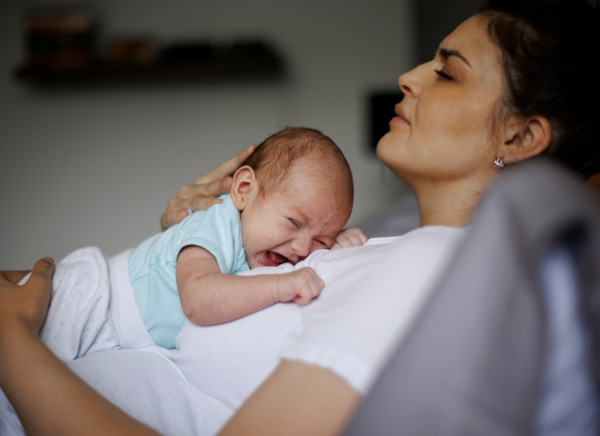
Image credit: Canva
You can look after your child with a fever at home if they:
- are drinking and feeding well
- are still interacting with you
- don't look sick.
Cooling cares
Undress your child so that they're just wearing a single layer (maybe a singlet and pants). Make sure the room is not too hot or too cold. These are the best and most comfortable ways to bring your child's temperature down. It's best not to give your child a bath or shower to cool them. You could use a cool face cloth.
Rest and fluids
Your child may need extra rest or they may want to play – this is okay.
Encourage your child to drink plenty of fluids. Offer them small amounts often. Your child may not feel like eating much. Their appetite will return as they start to get better.
Medicines
If your child is happy, and they're not unwell, you don't need to do anything more. You don't need to treat the fever with a medicine.
Paracetamol
If your child is miserable because of the fever, you can give paracetamol to make them more comfortable. You must follow the dosage instructions on the bottle. It's dangerous to give more than the recommended dose. You can use our paracetamol dose calculator to find out how much to give them.
Other medicine
If your healthcare provider gives your child ibuprofen, use it only if your child with a fever is miserable. You can use our ibuprofen dose calculator to find out how much to give them.
Don't give your child cold and flu medicines.
Never give your child aspirin as this may increase the risk of Reye syndrome, which is a rare and serious illness.
Temperatures and thermometers(external link) KidsHealth, NZ
Apps
Brochures
Thermometers – how to use them(external link) KidsHealth, NZ
After your child is immunised(external link) HealthEd, NZ
Danger signs – baby and child sickness(external link) HealthEd, NZ Also available in te reo Māori(external link)
Identifying the risk of serious illness in children with fever(external link) BPAC, NZ, 2024
Fever – neutropenic(external link) Starship, NZ, 2014
Fever in under 2 month olds(external link) Starship, NZ, 2022
Fever in children(external link) Goodfellow Unit Webinar, NZ, 2021
Brochures
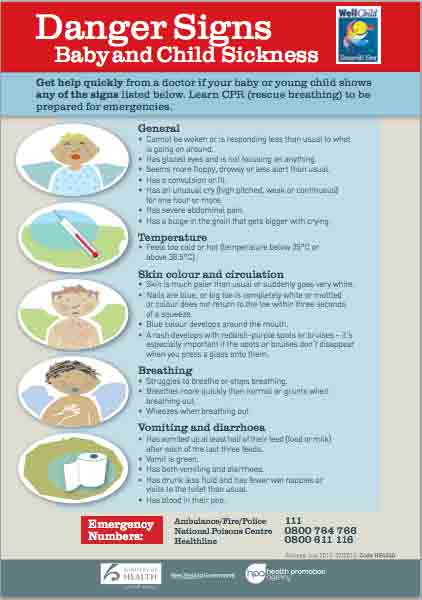
HealthEd, NZ, 2023 te reo Māori, English
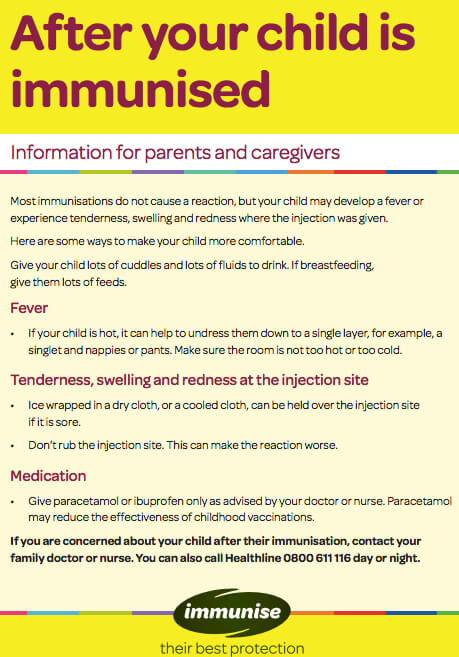
HealthEd, NZ, 2023
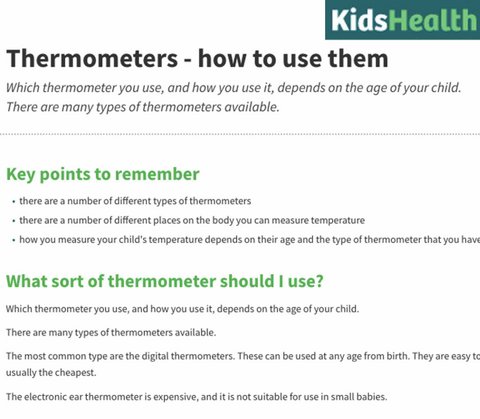
KidsHealth, NZ, 2015
Credits: This content has been collaboratively developed by Health New Zealand | Te Whatu Ora, KidsHealth, and Healthify He Puna Waiora to provide trusted health information.
Last reviewed:





